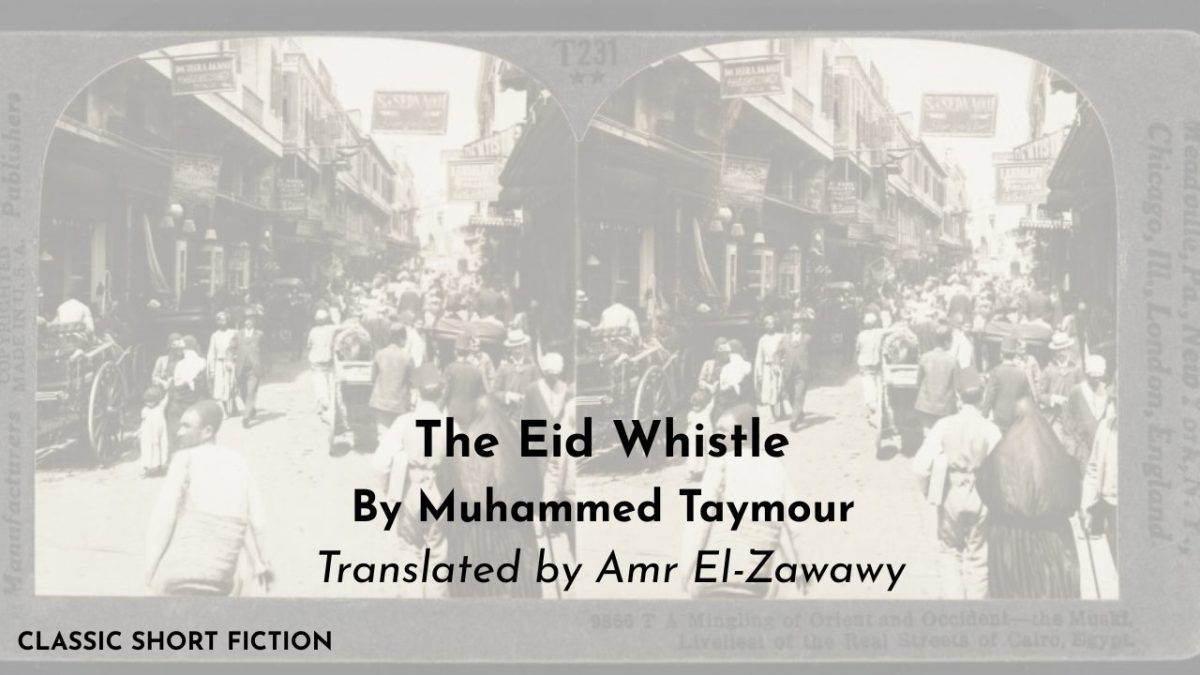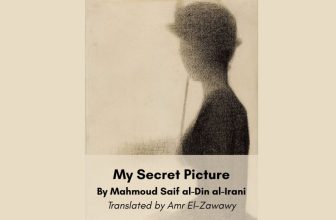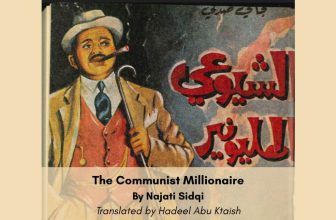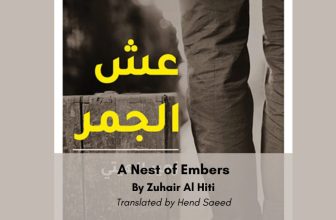
The Eid Whistle
By Muhammed Taymour
Translated by Amr El-Zawawy
The alley we speak of is long, narrow, and devoid of sidewalks. It begins with a thick wall and ends at the grand street. There, on the right, stands a magnificent palace that might easily be mistaken for a prison built for criminals. On the left rests a fake saint’s tomb. Before it, men and women pause, reciting the opening chapter of the Quran, with hopeful and supplicating eyes lifted skyward. Then they wipe their faces with their hands, as though sealing God’s blessings upon them.
If you wander down the alley toward its middle, you will find Umm Melim, the falafel and salads vendor, crouched before her modest stall—a dingy crate displaying her wares to cart drivers, wayfarers, and laborers. Should you approach the alley’s entrance, where the thick wall blocks the paths of passersby, you will find a great tree. There, beneath its shade, the weary and exhausted seek refuge. Yet, if you walk too quickly, take care not to stumble over a small mound no more than ten centimeters high—the refuse scattered by careless hands.
The palace belongs to a pasha who has refused to abandon the neighborhood where his ancestors once lived. It is, as we have said, grand indeed. At its entrance sits a eunuch, one leg crossed over the other, his fingers absently rolling a string of prayer beads to stave off boredom and weariness. He is an aged man, past fifty-five, with lips resembling slices of beefsteak served in Cairo restaurants, eyes that redden each time he utters the name of the Almighty in fervor, and a flat nose, like a frog that has found in his face a fertile home. He is tall and heavyset; he walks with elephantine steps.
*
This was the first day of Eid. The streets were abuzz with merriment, and children frolicked, dressed in their new clothes, clutching their toys as they chatter and scamper. The fathers, too, were merry, strolling the streets, greeting one another with, “Eid Mubarak!”
Among the children, one stood apart—a lanky boy with a sallow complexion. His eyes reflected joy for his playmates and sorrow for himself, deprived as he was of their happiness. He felt ashamed of his tattered clothes and bare feet. He lingered near them, hands clasped behind his back, a timid smile on his face, as if seeking permission for a share in their joy—a simple request, for was he not a child like them? He, too, wept when hurt and laughed when happy. But how could he find joy when he was an orphan? His mother had died when he was five, and his father followed her two years later. His uncle took him in his care, but how could the kindness of an uncle’s wife compare to a mother’s affection?
The children ambled slowly out of the alley, agreeing to race down the grand street. They ran several rounds until one of them stumbled and fell. His companions rushed to him, laughing like chirping birds, helping him to his feet. He rose, his face clouded, tears brimming in his eyes. Yet, he remembered it was Eid—a day when sorrow was forbidden, happiness a duty. So, he brushed off his pain, forced a smile, and ran after his friends. But the orphan could not forget his pain—those deep, killing wounds that put out his lights and snatched his beauty.
The children left the grand street and returned to the alley, laughing and singing, until they reached the great tree. There, one of them exclaimed, “We’ve gone too far! The vendors pass by the main street. Let’s go back!”
With joyful shouts, they raced away.
*
At that moment, a cart trundled down the grand street, its driver perched atop it—a broad, square-built young man, with a head that seemed to have four corners, its surface as flat as a board. He urged his horse forward while singing a rustic song:
“My dark-skinned love, young and fair, has bewitched me.”
As he neared the eunuch, he greeted him sonorously. The eunuch replied with a curt nod, lips barely parting, shaking his head in silent disapproval at the deteriorating manners of the masses.
At the same time, the children returned from the grand street, each clutching a whistle bought from a street vendor. They began blowing into them, filling the air with a cacophony of discordant yet cheerful notes. The orphan stood among them, moved by the music. He drew closer and, unable to resist, danced along with them.
The oldest of the children turned to him and asked loudly, “Where’s your new outfit, Ali?”
The orphan said nothing. The others laughed.
Another child asked, “Where’s your whistle, friend?”
A third cut in: “Enough dancing! Let’s all blow our whistles! If you don’t have one, you should dance instead.”
The orphan did not stop dancing. He couldn’t bear to stand idle while the others celebrated. He ignored their jests as if he had not heard them.
At that moment, a short-of-stature, long-bearded religious scholar passed by. He was walking slowly, stroking his beard with one hand and his prayer beads with the other. The children rushed to greet him, and even the eunuch stood, walking over to kiss the man’s hand, while the others kissed the hem of his robe. This man was the leader of the Naqshbandi order, a sect requiring its followers to utter the name of God every ten minutes. Its founder had died five centuries ago with the name of the Almighty engraved upon his heart. Hence, the order’s name.
A candy vendor passed by. The children flocked to him. The orphan followed, though he lagged behind. Pitying him, one child offered him a piece of candy.
Ali shook his head in refusal. Offended, the other boy flung the sweet to the ground. The orphan picked it up and offered it to a hungry dog that wagged its tail at him. Then he walked away, his face a portrait of both sorrow and pride. Though surrounded by others, deep down, he felt lonely. The boy who had spurned him strutted away, tilting his head in arrogant disdain.
The children turned their gazes to the grand street and quickly spotted Mahmoud, the neighborhood’s bully. They clapped and cheered, “Mahmoud the lion is here!”
Mahmoud, their idol, smiled and strolled past, brandishing his staff like a knight with his sword. He was a husky man who could win almost every fight. He was feared and respected everywhere, his reputation stretching beyond their street.
The eunuch cast him a scornful glance, which Mahmoud met with a hearty, loud laugh that made heads turn. The eunuch, in turn, spat on the ground—the only insult he could muster.
One child cried, “Let’s wrestle! And the winner takes his opponent’s whistle as a prize?”
Another added, “Mahmoud can be our referee!”
A third pointed at the orphan and said, “But Ali has no whistle!”
The boy who had mocked him earlier declared, “I’ll wrestle him! If he wins, he gets my whistle. If I win, I’ll slap him in front of everyone!”
The children cheered. Ali’s face darkened, but he rolled up his sleeves, preparing for the battle. One fought for a whistle, the other for his dignity—a vast difference between the two.
Ali triumphed, pinning his opponent to the ground. As he rose, he demanded, “Where’s my whistle?”
The boy hesitated, then reluctantly handed it over. Ali took it, placing it between his lips as if it were a goblet of cool water. But the children burst into laughter, mocking him for winning a prize he had not bought himself. Overcome, Ali flung the whistle away and walked off slowly as they clapped behind him.
He reached the great tree and sat under its shade, leaning his back against its trunk. The alley was as bleak as his heart. He buried his face in his hands and whispered, “Oh, Mama… Oh, Baba…” while the children sang in the grand street.
He looked up from his fit of depression when he found a dry tongue licking away his tears. The same dog he had fed now comforted him.
August, 1917
Muhammed Taymour is regarded as a pioneer of modern fiction and theatrical literature in Egypt. Born in Cairo in 1892 and raised by an aristocratic family, he was deeply rooted in a literary tradition—his father, Ahmed Taymour Pasha, was a devoted scholar of the Arabic language, his aunt was the renowned writer Aisha Taymur, and his brother, Mahmud Taymour, also became a prominent author.
Initially traveling to Paris to study law, he returned to Egypt in 1914 following the outbreak of World War I, dedicating himself to writing plays and short stories. He later moved to Berlin to pursue medical studies, though neither medicine nor law aligned with his true passion—literature. His love for literature had originally inspired his journey to France, where he immersed himself in European works, especially French literature, which left a lasting influence on his writing style.
He also published a short-story collection titled What the Eyes See. He passed away on February 24, 1921, not yet thirty.
Amr El-Zawawy is Professor of Linguistics and Translation, Faculty of Education, Alexandria University, Alexandria, Egypt. He has also practiced written and simultaneous translation for more than 20 years now. He contributed important articles to different international scholarly journals, including but not limited to Babel (John Benjamins), Journal of Psycholinguistics, California Linguistic Notes and Advances in Language and Literary Studies. He published a number of books and translations, including Studies in Contrastive Linguistics and Stylistics (Novika, USA), Exploring the Cognitive Processes of Simultaneous Interpreting (Lexington Books, USA), Seminal Studies in Linguistics and Translation (Cambridge Scholars, UK), and Selections from Arabic Poetry (Kindle, Amazon).
More in this series of classic short fiction:
Muhammad Taymour’s ‘A Boy Who Became a Man’
Maroun Abboud’s ‘Among the Problems of the Village’







